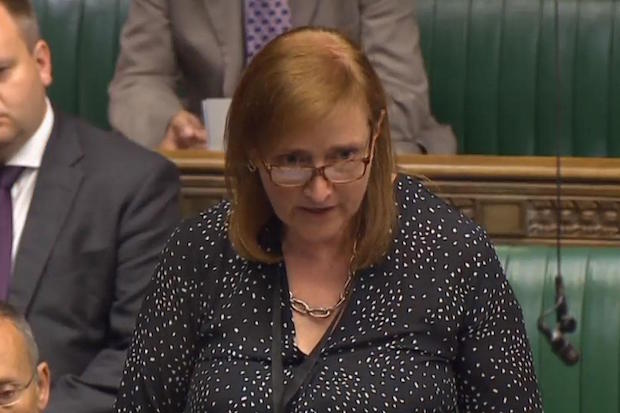Why does Emma Dent Coad continually get into trouble for spiteful comments, tweets and jokes about her political opponents and those with a privileged accident of birth such as members of the royal family? Perhaps the Kensington MP is suffering from a strange cognitive dissonance resulting from having to represent a fair few people whose accidents of birth have enabled them to live in the many prestigious parts of the constituency she won in this year’s election. Or perhaps she thinks she is being clever.
The latest row that the Labour backbencher has sparked is over a retweet from a strange Twitter account called ‘Rachael Swindon’, which boasts that it has been ‘blocked by 85 Tory MPs’ and sends a remarkable number of angry tweets on a daily basis. Mr Steerpike has more on the tweet, which suggested that Theresa May’s face conformed to Roald Dahl’s tale in The Twits about how people with ugly thoughts end up with ugly faces.
Dent Coad is so regularly egregious that she is almost providing a service to those on the other side of the political spectrum who want to get angry. But aside from whether elected representatives really should endorse these kinds of comments, or make their own, there’s a question about why some MPs think it’s a good idea to behave in this way. Is sneering and being unpleasant an attempt to make themselves seem clever, somehow bigger than their opponents? If so, they are failing: sneering comes from insecurity and laziness and only makes a person seem smaller.
Kindness and generosity do not impede good scrutiny, opposition or debate. But they do show a strength of character far beyond that of the playground bully who lashes out and sneers to make himself feel less miserable. Those in politics and the rest of life who decide to show their opponents warmth and respect, often to a seemingly unreasonable extent, are showing how much bigger they are: these are hard things to decide to exhibit, though they do leave everyone feeling much happier than cold, haughty spite ever does.
Being kind and generous to people you instinctively dislike – even with good reason – is something someone has to decide to do. Which is why it’s so difficult for people in politics today to manage to do it. Social media is so quick and pithy that we all give into our initial visceral instincts towards people, rather than trying to summon up the more admirable courage to be kind. And we spend so much time on social media that we end up repeating that behaviour in public, too.
Twitter also encourages people to act up to their own side, feasting on the approving likes and retweets of others who have given into their spite, without wondering what the people who didn’t respond to the post thought. It’s even worse than a party conference bubble in that respect.
Of course, we do know that the bigger people in politics are the kind ones. It’s worth reading back through the tributes paid in the Commons and elsewhere to Charles Kennedy when he died. He was respected for his quick intellect, his ability to scrutinise and dissect arguments and his humour, but all of those were founded on an incredible warmth and kindness that everyone who had met him – whether they themselves were a big wig too, or just the sort of junior staffer who normally gets overlooked – knew very well. A man as clever as Kennedy didn’t need to resort to spite to make himself bigger, and he is missed from Westminster today because of that. Similarly Jo Cox, who argued from the beginning of her short time as an MP that we have more in common than that which divides us, was passionate about her politics but also about not being hateful. We miss those two far more than those who have used whatever time they have in the Commons to be vicious rather than persuasive, polite and empathetic.







Comments